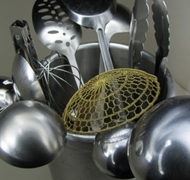On Loss: Thanksgiving Without a Loved One
Blog / Produced by The High Calling
I leaned against the doorframe and surveyed the dim kitchen. Spotless countertops. Pans tucked into cupboards. Unused wooden spoons, spatulas and ladles poised in the pitcher by the stove. A stack of stained potholders and oven mitts sat untouched in the drawer. Pizza boxes and paper plates were heaped in the trashcan, remnants of supper the night before.
Our family had eaten Thanksgiving dinner at my brother- and sister-in-law’s house earlier that afternoon. We didn’t speak of it much, but all of us were keenly aware of my mother-in-law’s glaring absence. She had died in September. This was our first Thanksgiving without her.
Thanksgiving was Janice’s holiday. She could roast a turkey to perfection (slide a few pats of butter under the skin for the most tender bird, she advised); fix a heaping bowl of freshly whipped potatoes; prepare cranberry relish so tart the thought of it still makes my mouth water; and create stuffing with a mix of savory spices and handfuls of day-old bread. Not only would a box of StoveTop Stuffing Mix never grace her pantry shelf, Janice never even bought the grocery store bag of pre-cubed bread to save time. She baked, too—a minimum of three pies from scratch every Thanksgiving, and there was always an apple in the mix, because she knew it was my favorite—the Granny Smiths baked not too firm, not too soft, the crust flakey and buttery.
“Are you sure I can’t do anything to help?” I’d ask every year, leaning against the butcher block island in the middle of her kitchen while she whisked gravy and peeked once more into the oven. She always considered the offer for a moment and then responded with the same answer: “Maybe in a little while you wouldn’t mind filling the water glasses?” I would laugh, knowing the routine. I was happy to snack on mixed nuts and observe, awed, from the bar stool as she moved briskly about the kitchen.
Dinner was finished hours ago. I watched from the window over the kitchen sink as my two boys chased their grandfather across the frozen yard in the waning November light. Snowballs whizzed past Jon’s head, and the boys hooted and hollered with laughter as they tried to stuff snow down the back of his pants. A smile, rare in those days so heavy with grief, widened across my father-in-law’s face.
Finally weary of roughhousing, the kids burst through the front door, dropping wet snow pants and jackets, boots and mittens on the floor. They squeezed rosy-cheeked onto the couch to watch SpongeBob. Papa rested behind the closed bedroom door, recovering from the grandkids’ onslaught.
I opened the front door to an icy blast and hopped in my stocking feet between spots of slush to retrieve the lone soaked mitten and hat that had been abandoned on the driveway.
And that’s when I spotted it stuck upright next to the shovel in the snow bank: her cake frosting spreader. Evidently the kids had snagged it from the pitcher of kitchen utensils on the counter and had used it to chip the ice into smooth blocks before stacking them into a snow fort.
I left it there in the snow, the smooth metal of the frosting spreader reflecting the light of the street lamp. Then, arms crossed over my chest against the wind, I stepped across the threshold, back into Janice’s quiet kitchen.
_________________________
Read part one of this two-part series on grief: "On Loss: The Hard Work of Your Last Harvest"
Michelle DeRusha is the author of the forthcoming book Spiritual Misfit: A Memoir of Faith (Convergent Books, April 2014). She blogs about living out faith in the everyday at MichelleDeRusha.com (no longer active), and lives in Nebraska with her husband, two boys and a pet lizard.
Image by John Ong. Used with permission. Sourced via Flickr.





